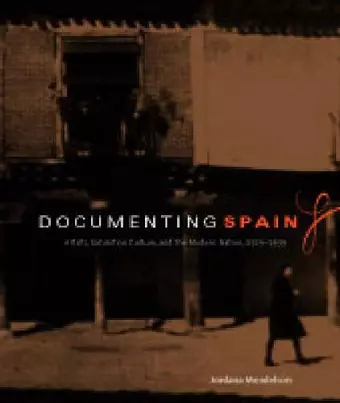Documenting Spain
Artists, Exhibition Culture, and the Modern Nation, 1929–1939
Format:Paperback
Publisher:Pennsylvania State University Press
Published:15th Oct '05
Currently unavailable, and unfortunately no date known when it will be back

The news media have given us potent demonstrations of the ambiguity of ostensibly truthful representations of public events. Jordana Mendelson uses this ambiguity as a framework for the study of Spanish visual culture from 1929 to 1939—a decade marked, on the one hand, by dictatorship, civil war, and Franco’s rise to power and, on the other, by a surge in the production of documentaries of various types, from films and photographs to international exhibitions.
Mendelson begins with an examination of El Pueblo Español, a model Spanish village featured at the 1929 International Exposition in Barcelona. She then discusses Buñuel’s and Dalí’s documentary films, relating them not only to French Surrealism but also to issues of rural tradition in the formation of regional and national identities. Her highly original book concludes with a discussion of the 1937 Spanish Pavilion, where Picasso’s famed painting of the Fascist bombing of a Basque town—Guernica—was exhibited along with monumental photomurals by Josep Renau.
Based upon years of archival research, Mendelson’s book opens a new perspective on the cultural politics of a turbulent era in modern Spain. It explores the little-known yet rich intersection between avant-garde artists and government institutions. It shows as well the surprising extent to which Spanish modernity was fashioned through dialogue between the seemingly opposed fields of urban and rural, fine art, and mass culture.
“Instead of isolating artists such as Buñuel and Dalí from the political contexts in which they produced their work, Mendelson studies the role these and other artists played in negotiating Spanish modernity and in conventional thinking about family and nation, rural and urban Spain, Republican and Fascist ideology.”
—Lou Charnon-Deutsch, author of The Spanish Gypsy
“This is a major study that I would expect to become a classic. The Spanish documentary practices chosen for analysis are all related to exhibition culture in some way but also to ethnographic studies in Spain at the time, which in turn provide crucial information about attitudes toward Spain’s relation to modernity and its ‘usable past.’”
—Jo Labanyi, University of Southampton
“Mendelson’s well-documented study sees this cultural phenomenon . . . as a recognition of the country’s modernity, or what modernity might have looked like in the Spain of the 1930s. . . . Smart, original, and well written, this book gives us a fresh view of artistic (documentary) activity during one of Spain’s most intense and troubled times.”
—David T. Gies Virginia Quarterly Review
“Smart, original, and well written, this book gives us a fresh view of artistic (documentary) activity during one of Spain’s most intense and troubled times.”
—David T. Giles Virginia Quarterly Review
“Documenting Spain is an admirable book, enhanced by the gorgeous presentation afforded by its publisher. Mendelson proves that daring cultural analysis can, in fact, coexist with rich empirical research.”
—Mauricio Tenorio Journal of Modern History
ISBN: 9780271024745
Dimensions: 241mm x 203mm x 24mm
Weight: 1134g
312 pages